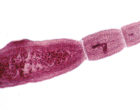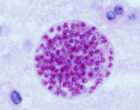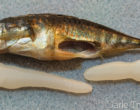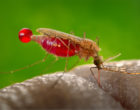The quest for a novel anti-echinococcal drug

Echinococcosis is an often fatal zoonotic disease caused by infection with the larval stage of tapeworms from the genus Echinococcus. These parasitic worms are… Read more »

Echinococcosis is an often fatal zoonotic disease caused by infection with the larval stage of tapeworms from the genus Echinococcus. These parasitic worms are… Read more »

Toxoplasma gondii is an infamously widespread parasite prevalent across much of the world, with nearly one-third of humanity predicted to be exposed to the… Read more »

Significant changes in gut microbial composition (gut dysbiosis) are induced by infection with the soil-transmitted helminth Trichuris trichiura, and effects… Read more »

Investigating gene expression in the brains of infected and uninfected sticklebacks can help shed light on the molecular mechanisms used by parasites to… Read more »

Evidence of shared immunodominance between Plasmodium falciparum and SARS-CoV-2 may explain low COVID-19 incidence in the malaria-endemic belt of Africa, and… Read more »

An investigation into schistosome digestive tract development reveals that the oesophageal gland, a site of protein secretion and entrance to the gut, could be… Read more »

The malaria parasite’s gametocyte-stage has been demonstrated in the field to heavily manipulate the blood-seeking behaviour of vector mosquitoes through… Read more »

A novel compound, active against a range of single celled parasites, has recently been discovered in the symbiotic bacteria living in the gills of a shipworm.

Bats have been identified as reservoir host for Leishmania parasites in Spain.

In a caste system similar to some social insects, larval stages of some parasitic trematodes are allocated to be soldiers to defend the colony when under… Read more »